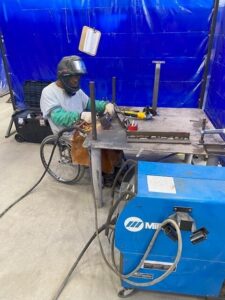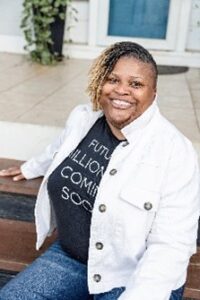July LEAD On! Newsletter
Celebrating Disability Independence
Learn about two historic, pivotal events in disability history celebrated each summer and how they strengthen independence for people with disabilities and those who support them.
ON TOPIC
Americans with Disabilities Act and Olmstead Decision
Americans celebrate their country’s Independence Day on July 4. However, two additional days advanced independence for people with disabilities in the U.S.
Thirty-four years ago, on July 26, 1990, President George H.W. Bush signed into law a groundbreaking, comprehensive civil rights law for people with disabilities: the Americans with Disabilities Act (ADA). Today, many celebrate the entire month of July as “Disability Pride Month.”
Twenty-five years ago, on June 22, 1999, the U.S. Supreme Court ruled in Olmstead v. L.C. & E.W. that states must provide services and programs for disabled people in the most integrated setting based on their needs and preferences and that unjustified segregation was a form of discrimination under the ADA.
In this newsletter, you will discover several disability independence resources, including:
- A digital booklet with 25 policy innovations and milestones stemming from the Olmstead decision,
- Olmstead success stories from the field, and
- Webinars and other resources celebrating disability independence.
The Olmstead 25th Anniversary Digital Booklet
Confined to a state-run psychiatric hospital despite wanting – and having been deemed ready by professionals – to transition to community-based services, Lois Curtis (L.C.) and Elaine Wilson (E.W.) brought the original lawsuit that led to the Olmstead decision. The impact of the ruling spread to other areas of service delivery, leading to the development and implementation of strategies focused on integrating people with disabilities into all aspects of the community, including the workplace. This digital booklet explores the Olmstead decision’s wide-ranging impact on policies and practices, illuminated by the stories of the people, agencies, and services that have been transformed by it.
ON THE GROUND
Celebrating the impact of Olmstead – Success stories from the Olmstead 25th Anniversary Booklet

Carolina’s Story
“After 20 years out of the workforce due to chronic illness, Carolina Zamora-Rocha met with Workforce Alliance, an American Job Center in New Haven, Connecticut, to begin her journey to become a certified pharmacy technician. Thanks especially to her Ticket to Work coordinator, Carolina now works as a pharmacy technician for Genoa Healthcare and no longer relies on Social Security benefits.

Larry’s Story
Larry Phillips dreamed of becoming financially self-sufficient with a career in welding. A wheelchair user with prior justice system involvement, Larry worked with South Carolina’s Vocational Rehabilitation and a local welding school to make his dreams a reality.

Ruby’s Story
Financial Joy School, led by CEO and Founder Ruby Sunshine Taylor, empowers Black youth and families by demystifying complex financial concepts. Ruby has spoken with lawmakers, written a bestseller, and served as an “Entrepreneur in Residence” for 2-Gether International, a startup accelerator for disabled founders. Jhiya

Jhiya’s Story
Jhiya Cooper participated in one of the first Guided Group Discovery cohorts in the D.C. public school system, which landed her an internship in hospitality and several paid jobs, including work at a cruise company.
ON CUE
Resource: The Olmstead effect: Celebrating 25 years of positive change
(June 20, 2024)
This blog post from Assistant Secretary of Labor for Disability Employment Policy Taryn Williams, who leads the Office of Disability Employment Policy (ODEP), reflects on the Olmstead decision, its impacts thus far, and its promises for a future of continued independence for people with disabilities.
Resource: Financial Literacy Education under the Workforce Innovation and Opportunity Act (WIOA)
(May, 2024)
Financial independence comes through education around financial topics, such as creating budgets, opening checking and savings accounts, and managing debt. Under the Workforce Innovation and Opportunity Act (WIOA), youth participants and adult job seekers with and without disabilities may be able to receive this vital financial literacy education. Learn more about services and resources to support financial independence.
Resource: Business Ownership, Self-Employment and Entrepreneurship Among People with Disabilities
(May 14, 2024)
For economic empowerment and independence, many people with disabilities seek small-business ownership and self-employment because of the freedom and flexibility they offer when compared to traditional employment. This document discusses the latest data around entrepreneurs with disabilities and what it may indicate for the future.
(May 12, 2022)
As the use of artificial intelligence and other technology grows, it is important to consider equitable access to and treatment of all users, including people with disabilities. This document provides tips to employers on how to comply with the ADA when using software in the hiring process and to job applicants and employees who think that their rights may have been violated.
After the State Settlement: Oregon’s Efforts to Increase CIE
(June 26, 2024)
The webinar highlights the work being done in Oregon and its efforts to expand competitive integrated employment (CIE) following the conclusion of the state’s settlement with the U.S. Department of Justice, also known as Lane v. Brown.
Celebrating the 25th Anniversary of Olmstead v. L.C.
(June 20, 2024)
To commemorate the 25th anniversary of the Olmstead decision, the Administration for Community Living (ACL), the U.S. Department of Health and Human Services Office for Civil Rights, and the U.S. Department of Justice partnered on this webinar/in-person event about the progress made and the barriers still in place to fully realizing the promise of this landmark decision.
Improving Employment Outcomes: The Critical Role of Financial Education
(April 29, 2024)
In this webinar, representatives from the National Association of Workforce Development Professionals (NAWDP) share findings from a recent study on the financial service needs of the workforce system, and several workforce professionals explain how they support jobseekers with disabilities through financial education and tools.
(April 25, 2024)
This webinar highlights several companies in the construction industry that are using inclusive hiring practices – including equitable workforce development pathways like pre-apprenticeship and Registered Apprenticeship programs, as well as labor-management partnerships – to benefit employees with disabilities and their employers.
Celebrating Olmstead: How Blending, Braiding, and Sequencing Leads to Integrated Employment
(June 29, 2022)
This federal interagency webinar focuses on blending, braiding, and sequencing (BBS) resources and funding to support employment outcomes and to promote equity and inclusion for people with disabilities.
ON THE HORIZON
Launch of the third iteration of Section 188 Disability Reference Guide
Three-part webinar series on the new Section 188 Disability Reference Guide
